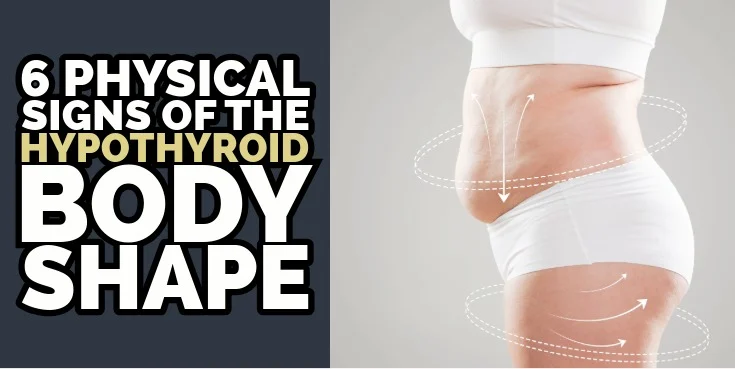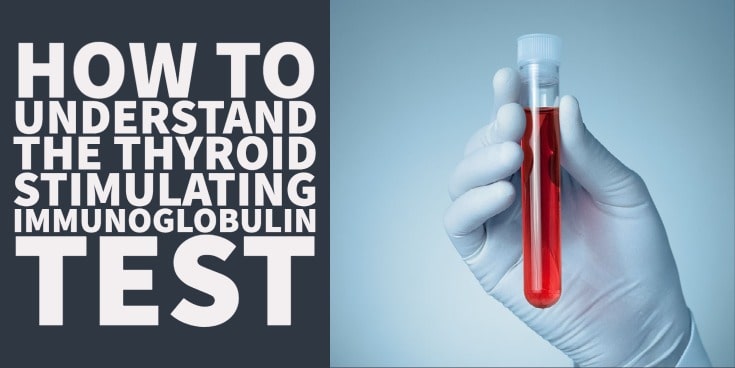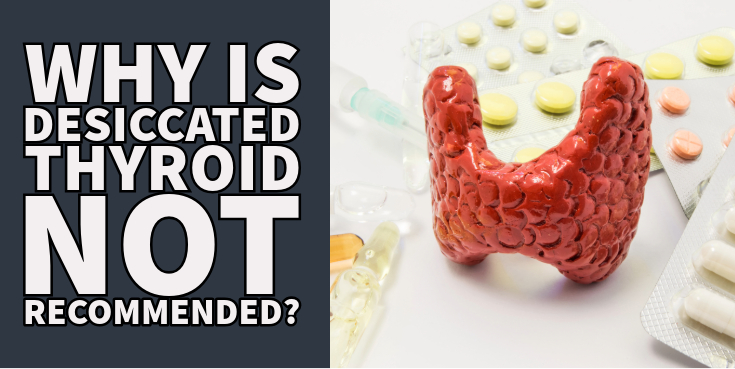Does it feel like you have an enlarged thyroid?
Do you notice a bulge in your neck or does your neck appear thicker?
Have you felt your thyroid and noticed that it is “lumpy” or “inconsistent”?
Are you experiencing symptoms that make you think there is a problem with your thyroid?
If you answered yes to any of these questions then you may have an issue with your thyroid gland.
This post will teach you all that you need to know about an enlarged/swollen thyroid including what it means, how to diagnose it, your next steps, and more:
What is an Enlarged/Swollen Thyroid?
Let’s start with some thyroid basics:
Your thyroid is an endocrine (hormone) gland that sits at the base of your neck.
It produces some of the most important hormones known in the human body: T3 and T4 known as thyroid hormones.
Disorders, including anatomical changes to the thyroid, can cause serious problems in the body which often present with certain symptoms.
These symptoms range from minor fatigue to massive weight gain, hair loss, constipation, and so on.
For such an important little gland in your body, there are a lot of potential problems that can arise with its function.
One of these problems is an enlargement of the gland.
This enlargement is often termed a “goiter” or a “swollen thyroid” and it is incredibly common.
The problem with an enlarged thyroid is that it is a nonspecific term that is simply used to describe the shape and size of the thyroid gland (1).
Knowing that your thyroid is enlarged or swollen doesn’t necessarily say anything about the function of your gland (which is perhaps one of the most important aspects of your thyroid).
We will talk about how to properly assess if your gland is functioning properly in the testing section below, but for now, let’s discuss the potential causes of an enlarged thyroid.
Causes of an Enlarged Thyroid
Knowing that your thyroid is enlarged is not a diagnosis by itself.
It’s more helpful to think of an enlarged thyroid gland as an observation or as a description of what is happening.
This is because there are actually many different conditions that result in thyroid gland enlargement.
These conditions range from infections, inflammation of the gland, nutrient deficiencies, cancer, and even autoimmune disease.
An important part of treating an enlarged thyroid gland is correctly identifying and diagnosing what is happening.
This important step can be done through blood testing and imaging (discussed below).
The range of medical conditions which can cause thyroid gland enlargement include:
- Thyroid nodules and thyroid cysts (VERY common with up to 4-10% of the entire population who has one of these)
- Thyroiditis caused by inflammation, infection, or autoimmune disease
- Thyroid cancer or other cancers
- Hashimoto’s thyroiditis (2) (autoimmune disease)
- Iodine deficiency (3) (results in diffuse enlargement of the entire gland)
These diseases can be differentiated based on how they present (your symptoms), how they affect the size of your thyroid gland (diffuse enlargement or isolated enlargement), how they look on ultrasound imaging, and how they affect thyroid hormone production.
Enlarged Thyroid vs Painful Thyroid
It’s important to differentiate between an enlarged thyroid gland and a painful thyroid gland.
This one single symptom is unique to very few conditions and can easily help you figure out a diagnosis.
Your thyroid gland is an organ that is susceptible to inflammation and infection, just like other parts of your body.
This condition occurs very rarely, however, because for the most part your thyroid is protected from the rest of your body.
Infections such as viral and bacterial bugs can result in a condition known as subacute thyroiditis (4).
This is one of the very few conditions that cause pain in the thyroid gland when touched.
Subacute thyroiditis can also result in an enlargement of the thyroid gland but it’s almost always associated with pain.
This pain is important because it can easily help differentiate other, more serious, conditions which cause an enlargement of your thyroid gland.
Does an Enlarged Thyroid Cause Symptoms?
Anatomical changes to your thyroid, such as changes to the size or shape of your thyroid, are most often found incidentally.
Patients are often quite surprised that they even have a thyroid issue until they are notified by their physician during a routine exam.
Problems that cause changes in the shape and size of the thyroid usually do NOT cause problems with the production of thyroid hormone.
This is important because the symptoms associated with dysregulated thyroid hormone production are often profound and easy to identify.
Instead, disorders of the shape and size usually are asymptomatic.
What this means is that they do NOT cause any symptoms.
Now, this isn’t true for all disorders because there are always exceptions.

These issues might present as problems swallowing, changes to your vocal cords or a change in your voice, or a bulge that is noticeable in your neck.
Occasionally, if your enlarged thyroid is due to swelling or inflammation, then you might also experience pain when touching your neck.
Some conditions which result in an enlargement of your thyroid gland are reversible and may go away on their own (such as some causes of Thyroiditis) while others may persist and cause permanent thyroid damage (such as Hashimoto’s thyroiditis).
Hopefully, you’re beginning to understand that in order to really understand what is happening with your thyroid gland you will need further evaluation.
Imaging and Evaluating Your Thyroid
One of the best ways to look at your thyroid gland is by imaging it or looking at it via ultrasound (6).
Ultrasound is a nearly painless procedure that allows radiologists to look at the size, shape, texture, and other characteristics of your thyroid gland.
Because the thyroid gland is near to the surface of your skin it can easily (usually) be assessed with this type of imaging.
The good news about ultrasound testing is that it is NOT associated with radiation exposure and is therefore considered to be very safe (7) (perhaps the safest of all imaging methods).
Doctors are often taught that the only way to hurt someone with ultrasound is by throwing the machine at them.
Ultrasound is very important if you have an enlarged thyroid because it can further help to diagnose what exactly you are dealing with.
For instance:
If you have a single large thyroid nodule, an ultrasound can pick up that nodule and give information regarding the size, shape, and consistency of the nodule.
This information can help to determine if the nodule is benign (about 97% of all nodules are benign and harmless (8)) or potentially cancerous (around 3% of nodules may be cancerous) and also help determine if you need a biopsy.
Other conditions that cause thyroid enlargement may be consistent and make your thyroid look “irregularly inconsistent” throughout the entire gland.
Conditions that cause this type of pattern tend to result in inflammation of the entire gland or may be caused by nutrient deficiencies such as iodine deficiency.
In addition to ultrasound testing, there are other ways to check your thyroid gland such as uptake tests or CT scans (computed tomography).
These tests usually come after ultrasound testing and your doctor can help you determine if you need them.
Lab testing for Your Thyroid
Looking at your thyroid gland via imaging doesn’t usually give you any information about the FUNCTION of the thyroid gland.
The function of your thyroid gland is very important because it relates to how well your thyroid is able to produce thyroid hormone.
Any change to the ability of your gland to produce thyroid hormone will result in very specific symptoms that are too big to be ignored and these symptoms will often drive people into the Doctors office for evaluation.
Fortunately, many conditions that result in thyroid gland enlargement (such as thyroid nodules) usually do not interfere with thyroid hormone production.
Some conditions, such as Hashimoto’s thyroiditis, cause both thyroid gland enlargement AND thyroid hormone issues.
Because of this, each and every patient with a known or suspected thyroid gland issue should undergo thyroid function testing with blood tests.
To test your thyroid function you will need the following tests:
- TSH (Thyroid Stimulating Hormone) (9) – This will help you understand if your brain is talking to your thyroid gland.
- Free T3 (10) – This is the most important thyroid hormone in your body and is responsible for the majority of thyroid cellular activity.
- Free T4 (11) – This is the most abundant thyroid hormone in your body and is important because it acts as a reservoir for T3 thyroid hormone.
- Thyroid Antibodies – The presence or absence of thyroid antibodies can help you understand if you have an autoimmune disease or if your body is attacking your own thyroid gland.
These lab tests represent the most basic tests necessary to evaluate your thyroid but they are NOT the only lab tests you can use.
You can find a complete list of lab tests that can be used to assess your thyroid function here.
Your Next Steps + Treating your Thyroid
If you suspect (or know) that you have an enlarged or swollen thyroid gland then you may be wondering what are you supposed to do next.
The world of thyroid management can be difficult to navigate, but I’ve created a list of steps below that you can check off to ensure that you are on the right track.
Following this list will help you with proper diagnosis and treatment (if necessary).
- [Always necessary] Get a full physical exam and history from your physician (12). This will include feeling your thyroid gland in your neck and asking about any other symptoms you may be dealing with.
- [Always necessary] If your thyroid is enlarged then your next step is to get ultrasound imaging (13). Ultrasound will help determine if you need a biopsy or if you can simply monitor your thyroid gland every few months.
- [Not always necessary] If necessary get a biopsy via FNA (14).
- [Not always necessary] If necessary get thyroid blood tests (see above).
- [Always necessary] Obtain a diagnosis as to what is CAUSING your enlarged or swollen thyroid. You need to NAME the issue you are dealing with. Potential diagnoses include Hashimoto’s thyroiditis, thyroid cancer, thyroid nodule, thyroid cyst, thyroiditis, etc.
- [Do no matter what] Ensure that you are eating a healthy diet that is high in fruits and vegetables but also low in processed and refined foods.
- [Do no matter what] Ensure that you are not deficient in any critical thyroid nutrients (such as Iodine). If necessary you may need to use supplementation to optimize these levels.
Final Thoughts
Your thyroid gland is a very important hormone-secreting organ in your body.
Because of its importance, you should always evaluate any suspected problems of this gland including enlargement.
Testing your thyroid can be done easily with blood tests and ultrasound testing.
These basic tests can give you a solid starting point and help point you in the right direction.
Remember:
Many causes of an enlarged thyroid do not necessarily require treatment, but some may cause permanent damage if not identified and treated.
Now I want to hear from you:
Are you having issues with your thyroid gland?
Is your thyroid gland enlarged or swollen?
Are you also experiencing symptoms?
Have you been assessed by a Doctor yet? Do you have a diagnosis?
Leave your comments below!
Scientific References
#1. https://www.ncbi.nlm.nih.gov/pubmed/23145396
#2. https://academic.oup.com/jcem/article/94/3/833/2596420
#3. https://www.ncbi.nlm.nih.gov/pubmed/25591468
#4. https://www.ncbi.nlm.nih.gov/pmc/articles/PMC2571803/
#5. https://www.ncbi.nlm.nih.gov/pubmed/16079218
#6. https://www.ncbi.nlm.nih.gov/pmc/articles/PMC3683194/
#7. https://www.ncbi.nlm.nih.gov/pubmed/21866043
#8. https://www.ncbi.nlm.nih.gov/pmc/articles/PMC3575959/
#9. https://www.ncbi.nlm.nih.gov/books/NBK249/
#10. https://www.ncbi.nlm.nih.gov/pmc/articles/PMC4699302/
#11. https://www.ncbi.nlm.nih.gov/pmc/articles/PMC4274666/
#12. https://www.ncbi.nlm.nih.gov/pmc/articles/PMC2379312/
#13. https://www.ncbi.nlm.nih.gov/pmc/articles/PMC4322035/
#14. https://www.ncbi.nlm.nih.gov/pmc/articles/PMC121968/








